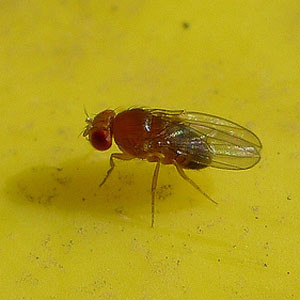Fruit Fly Problems During Harvest Season
By Chris Williams on September 6, 2013.

Question
We have fruit flies in the house again. We seem to get this problem every summer about this time. Why is that?
Answer
Fruit flies can be a year-round pest in homes but they can be worse during harvest season. They’re associated with ripe fruits and vegetables which are more common in our homes at this time of the year, either from our own gardens or from farmers’ markets or roadside stands. In late summer, over-ripe or rotting fruits and vegetables are also abundant in gardens or on the ground under fruit trees.
Fruit flies get into your home by flying in from outside, or they can be carried in as larvae or eggs in ripe produce. If you look closely when you visit an outside produce stand, you will likely see fruit flies hovering over an area or flying in small, slow circles over the produce, and maybe landing briefly to lay eggs on that one ripe tomato that you were eyeing!
Fruit flies are attracted to the gases given off by fermentation in foods like wine, vinegar, cider, beer, and yeast, and also when fruits and vegetables ripen or rot. It takes very little food to breed fruit flies. Hundreds can breed in the residue inside an “empty” ketchup bottle; thousands in the liquid spills in the bottom of a dirty garbage can. Read more about finding the source of fruit flies in your home.
The “Other” Sources of Fruit Flies
If you can eliminate your fruit fly problem by simply eliminating the exposed ripe fruit in your home…you’re lucky. Once you have a fruit fly infestation, it can continue for months if there are other sites in your home where the flies are able to breed. Some of these sites are hidden and not so obvious. Besides ripe fruit, these are just some other areas where fruit flies can breed: spills in the bottom of recycling bins, “vinegary” food containers (ketchup or mustard bottles, beer bottles, pickle jars, etc.) in recycling or garbage that still have residue inside, drip pan under the refrigerator, potato or onion bins, spills under appliances, residue in the bottom of garbage cans, beer or wine dispensers, dirty mop buckets or slop sinks, dirty garbage disposals or trash compactors. Sometimes fruit flies can be tracked to even more unlikely food sources like compost piles, slimy potted plant saucers, or even animal feces.
If you’re overwhelmed with fruit flies, give Colonial a call. Our trained technicians can help find hidden breeding sites. There are fruit fly traps available and insecticides will give temporary relief but are not a permanent solution. Flies will continue to breed as long as there are suitable food sources available. Getting rid of a fruit fly problem is usually a three-step process. First, track down each and every breeding site. Second, remove the rotting and fermenting material that is breeding the flies. Finally, take steps to prevent the food material from once again accumulating and attracting new flies.